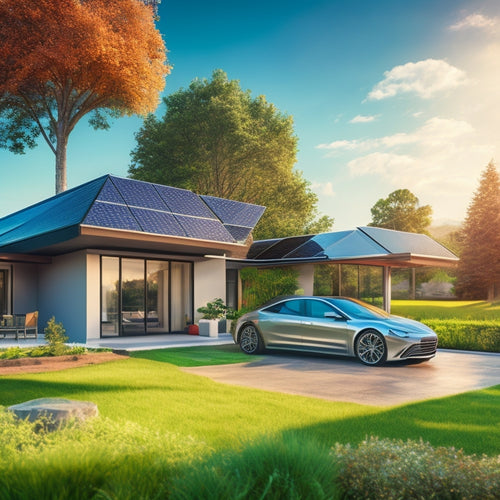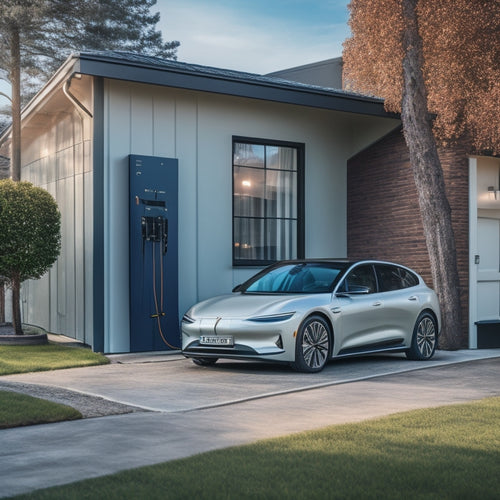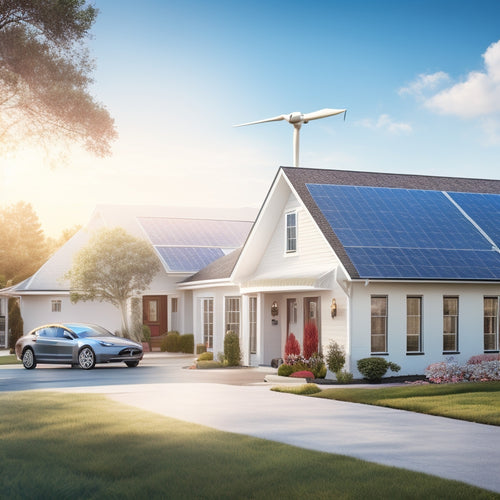
What to Consider Before Installing Home Solar Energy
Share
When contemplating a home solar energy installation, you'll want to carefully evaluate your energy needs, examining your past electricity bills, daily habits, and high-energy appliances. You'll also need to reflect on your roof's size, condition, and orientation, as well as potential shading and obstruction factors. In addition, you'll need to research local building codes, permits, and regulations, and choose high-quality solar panels and inverters. Moreover, you'll want to think about battery backup systems, grid connection, maintenance costs, and warranty options. By understanding these key factors, you'll be well-prepared for a successful shift to renewable energy - and there's still more to investigate.
Key Takeaways
- Assess your energy needs by reviewing past bills, identifying high-energy appliances, and customizing your solar panel system size accordingly.
- Ensure your roof is suitable for solar panels, considering size, orientation, condition, and potential obstructions.
- Research and comply with local building codes, permits, and regulations to avoid installation delays and fines.
- Evaluate the quality and durability of solar panels and inverters, considering warranties, efficiency ratings, and environmental impact.
- Consider factors like battery backup, grid connection, and net metering to ensure a reliable and efficient solar energy system.
Assessing Your Energy Needs
Your energy future begins with a thorough understanding of your current energy needs. To get started, take a close look at your past electricity bills to identify your energy consumption patterns.
Analyze your daily habits and lifestyle changes that may impact your energy usage. For instance, do you work from home, or do you have a large family? These factors will influence the size of the solar panel system you'll need.
Next, consider the appliances and devices that consume the most energy in your home. Are you using energy-efficient LED bulbs, or are you still relying on traditional incandescent bulbs?
Are there opportunities to upgrade to energy-efficient appliances or adjust your usage habits to reduce consumption? By understanding your energy needs, you'll be able to determine the appropriate size of your solar panel system and maximize its benefits.
Accurate assessment of your energy needs will guarantee that your solar panel system is customized to your specific requirements, providing you with the power and energy independence you desire.
Roof Size and Condition
You'll need to determine if your roof has enough space to accommodate a solar panel system.
The size and number of panels you can install depend on your roof's available space, so it's crucial to assess its dimensions and layout.
Additionally, you must verify your roof's structural integrity can support the added weight of the solar panels.
Roof Space Availability
The roof's size and condition play an essential role in determining the feasibility of a home solar energy system. You need to assess whether your roof has enough space to accommodate the required number of solar panels. A general rule of thumb is to have at least 100 square feet of roof space per kilowatt of solar power.
For example, if you want to install a 5-kilowatt system, you'll need around 500 square feet of roof space.
The orientation of your roof also matters. South-facing roofs are ideal for solar panel installation, as they receive the most direct sunlight. East- and west-facing roofs can also work, but north-facing roofs may not be suitable.
Additionally, consider the condition of your roof. If it's old or damaged, you may need to replace it before installing solar panels, which can add to the installation costs. Be sure to factor in these costs when calculating the overall cost of your solar energy system.
Structural Integrity Matters
Structural Integrity Matters
Most residential roofs are designed to support a certain amount of weight, and solar panels add to that load. You'll need to verify your roof's load-bearing capacity can handle the additional weight of the solar panels, which can range from 2-4 pounds per square foot. The type of roof materials, such as asphalt shingles or metal, will impact the roof's ability to withstand the added weight.
Your installation team will assess your roof's condition and recommend installation techniques that guarantee weather resistance and minimize structural modifications.
In areas prone to high winds or seismic activity, additional measures may be necessary to ensure the solar panels can withstand these forces. An engineering assessment will help identify any potential issues and provide solutions to mitigate them.
It's crucial to take into account your local climate and potential weather-related stressors when evaluating your roof's structural integrity. By doing so, you can guarantee a safe and efficient solar panel installation that meets your energy needs.
Shading and Obstruction Factors
Shading and Obstruction Factors
Surrounding trees, buildings, and even roof features can cast shadows on your solar panels, substantially reducing their energy output. To guarantee peak energy production, you'll need to conduct a shading analysis to identify potential obstacles. This assessment will help you determine the impact of shading on your system's performance.
You'll want to take into account the time of day and year when shadows are most prominent, as well as the duration of shading.
An obstruction assessment is also vital to identify any permanent or temporary obstructions that may affect your solar panels. This includes nearby structures, chimneys, vents, and skylights.
By evaluating these factors, you can determine the best placement and orientation for your solar panels to maximize energy output. Additionally, you may need to think about pruning trees or relocating obstructions to guarantee peak performance.
Don't underestimate the impact of shading and obstructions on your solar energy system – take the time to conduct a thorough analysis to make sure you're getting the most power from your investment.
Local Building Codes and Permits
You'll need to guarantee your solar energy system complies with local building codes, which vary by jurisdiction.
To do so, you'll have to obtain the necessary permits, and understanding the application process is vital to avoiding delays and costly revisions.
Code Compliance Requirements
In accordance with local regulations, your solar energy system must meet specific building codes and permitting requirements before installation can begin.
You'll need to confirm your system complies with safety standards and installation guidelines set by local authorities. This includes meeting electrical and fire safety codes, as well as building codes related to structural integrity and roof loading.
Your solar energy system must also meet the requirements of the National Electric Code (NEC) and the International Building Code (IBC).
Additionally, you may need to comply with local ordinances, such as zoning laws and homeowners' association rules. It's vital to verify the specific code requirements in your area, as they can vary greatly.
Failure to comply with these codes and regulations can result in costly rework, fines, or even system shutdown.
Consequently, it's important to work with a licensed and experienced solar installer who's familiar with local code compliance requirements. They can confirm your system meets all necessary standards, giving you peace of mind and a safe, efficient solar energy system.
Permit Application Process
Obtaining the necessary permits is a critical step in the solar energy installation process. You'll need to secure permits from your local government to guarantee your solar panel system meets local building codes and regulations.
The permit application process typically involves submitting detailed plans and specifications of your solar energy system, including the type and number of panels, inverters, and mounting systems.
You'll need to provide documentation, such as electrical and structural drawings, to demonstrate compliance with local building codes. Be prepared to pay application fees, which vary by jurisdiction.
Permit timelines also vary, but you can expect the process to take several weeks to several months. It's crucial to factor in these timelines and fees when planning your solar energy installation.
Once you've submitted your application, local authorities will review your plans and conduct inspections to verify your system meets safety and performance standards.
After approval, you'll receive the necessary permits to proceed with the installation. Remember to budget for permit costs and plan accordingly to avoid delays in your solar energy project.
Solar Panel Quality and Durability
The quality and durability of your solar panels play an essential role in determining the overall performance and lifespan of your home solar energy system.
You'll want to verify the panels you choose can withstand various environmental conditions and maintain their energy efficiency ratings over time. A high-quality solar panel can last up to 30 years or more, with minimal performance degradation.
Look for manufacturers with a strong reputation for producing durable panels with excellent weather resistance. Additionally, consider the installation craftsmanship, as improper installation can lead to premature wear and tear.
It's also crucial to think about the environmental impact of your solar panels, including their recyclability at the end of their lifespan. Some manufacturers offer recycling options, which can help minimize electronic waste.
Inverter Type and Efficiency
When selecting an inverter for your home solar energy system, you'll want to take into account two critical factors: inverter conversion efficiency and inverter durability.
The inverter's conversion efficiency determines how much of the DC power from your solar panels is converted into usable AC power for your home, with higher efficiencies resulting in more energy produced.
Inverter Conversion Efficiency
About 95% of solar energy systems rely on inverters to convert DC power from solar panels into AC power for homes. As you consider installing home solar energy, it's crucial to understand the importance of inverter conversion efficiency. The inverter's efficiency determines how much of the DC power is successfully converted into usable AC power for your home.
Inverter technology advancements have led to significant improvements in conversion efficiency. Modern inverters can achieve efficiencies of up to 98.5%. This means that only a small amount of energy is lost as heat during the conversion process.
Here's a comparison of different inverter types and their typical conversion efficiencies:
| Inverter Type | Typical Efficiency | Inverter Lifespan Considerations |
|---|---|---|
| String Inverter | 95-97% | 10-15 years |
| Microinverter | 95-97% | 20-25 years |
| Power Optimizer | 97-98% | 20-25 years |
| DC-DC Converter | 98-98.5% | 10-15 years |
| Hybrid Inverter | 95-97% | 10-15 years |
When selecting an inverter, consider the conversion efficiency and its impact on your system's overall performance. Higher efficiency inverters may come at a higher upfront cost, but they can provide greater energy savings over the inverter's lifespan.
Inverter Durability Factors
You're likely considering multiple factors as you weigh your inverter options, and inverter durability is definitely one of them. After all, you want your solar energy system to last for years to come.
When evaluating inverter durability, you should consider the following factors:
-
Inverter type: String inverters, microinverters, and power optimizers each have their own strengths and weaknesses when it comes to lifespan. For example, string inverters are generally more prone to failure than microinverters.
-
Inverter technology: Look for inverters with advanced technologies like maximum power point tracking (MPPT) and advanced cooling systems, which can increase efficiency and reduce wear and tear.
-
Environmental factors: If you live in an area with extreme temperatures, high humidity, or exposure to saltwater, you'll want an inverter that's designed to withstand these conditions.
- Warranty and support: A thorough warranty and reliable customer support can provide peace of mind and protect your investment in case something goes wrong.
Battery Backup Considerations
Taking into account the unreliability of the grid and the intermittent nature of solar energy, having a battery backup system in place can be an essential component of your home solar energy installation.
You'll want to evaluate the type of batteries you'll need, as different types have varying characteristics. For example, lead-acid batteries are cost-effective but heavy and less efficient, while lithium-ion batteries are more efficient but pricier.
You'll also need to factor in installation costs, which can range from $5,000 to $15,000 or more, depending on the size and complexity of the system.
When selecting a battery backup system, contemplate your energy needs during a grid outage. How much power do you need to keep your essential appliances running?
You'll also want to think about the depth of discharge (DOD), which affects the battery's lifespan. A higher DOD means you'll get more use out of your batteries, but it may reduce their overall lifespan.
Grid Connection and Net Metering
Hooking up to the grid allows your solar energy system to offset your energy consumption and even sell excess power back to the utility company.
This setup, known as net metering, enables you to generate energy credits when you produce more power than you consume. These credits can then be used to offset your energy consumption during periods of low sunlight.
Here are some key benefits to evaluate when connecting to the grid:
-
Utility rates: By generating your own energy, you can reduce your reliance on the utility company and lower your energy bills.
-
Energy credits: Excess energy produced is credited back to you, allowing you to draw from the grid when needed.
-
Grid reliability: In the event of a power outage, you can still draw energy from the grid, ensuring a reliable source of power.
- System scalability: With a grid connection, you can easily scale your system up or down as your energy needs change.
Maintenance and Repair Costs
Most solar energy systems require minimal maintenance, but like any complex system, they're not entirely maintenance-free. You'll need to evaluate the costs associated with keeping your system running at peak performance.
Cleaning your solar panels is a vital aspect of maintenance, and the frequency of cleaning will depend on your location and climate. If you live in a dusty or polluted area, you may need to clean your panels more frequently to guarantee maximum energy output.
In addition to cleaning, you should also budget for potential repair services. While solar panels are designed to last for decades, other system components like inverters and mounting systems may require replacement or repair over time.
You'll want to research local repair services and their associated costs to factor into your overall maintenance budget. It's important to have a clear understanding of these costs to make sure you can keep your system running efficiently and effectively.
Warranty and Customer Support
When investing in a home solar energy system, understanding the warranty and customer support offered by the manufacturer and installer is vital. You want to verify that you're protected in case something goes wrong or you need assistance with your system.
There are several types of warranties to evaluate:
-
Equipment warranty: Covers defects in the solar panels, inverters, and other equipment.
-
Performance warranty: Guarantees a certain level of energy production from your solar panels.
-
Workmanship warranty: Covers installation errors or defects.
- Extended warranty: Offers additional protection beyond the standard warranty period.
When assessing customer support, reflect on the following: What kind of support does the manufacturer and installer offer? Is it available 24/7 or only during business hours?
Are there online resources, such as tutorials and FAQs, available to help you troubleshoot issues? Knowing what kind of warranty and customer support you can expect will give you peace of mind and help you make an informed decision when investing in a home solar energy system.
Frequently Asked Questions
Can I Install Solar Panels on a Metal or Clay Tile Roof?
You'll need to assess your metal or clay tile roof's suitability for solar panels, considering installation requirements and ensuring roof durability can support the added weight and potential water leakage points before proceeding with installation.
How Long Does It Take to Install a Home Solar Energy System?
You'll typically spend 3-5 days waiting for permits, 1-3 days on site preparation, and 2-5 days for installation, with the entire process taking around 1-3 weeks, depending on the system components and intricacies of your installation timeline.
Can I Add Solar Panels to an Existing Solar System Later?
You can expand your existing solar system by adding more panels, but you'll need to verify system compatibility; check your inverter's capacity and panel compatibility to confirm a seamless solar panel expansion that maximizes your energy output.
Will Solar Panels Increase My Property Tax Bill?
You're thinking solar panels will skyrocket your property tax bill, but surprisingly, many states exempt solar panels from property tax assessments, so you won't see an increase; however, it's crucial to check your local laws regarding property tax implications.
Can I Install Solar Panels on a Rental Property?
You'll need to review your renter agreements to see if installing solar panels is allowed; if so, you can benefit from solar incentives, but be aware that the property owner may claim them, so negotiate accordingly.
Related Posts
-

What Solar Panels Work Best With EVS Online?
When shopping for solar panels online to power your electric vehicle, look for high-efficiency models that can withst...
-

5 Essential Tips for Buying EV Charging Systems Online
When purchasing an EV charging system online, you'll want to make sure you're making an informed decision. First, det...
-

Why Homeowners Are Embracing DIY Energy Independence
By taking control of your energy needs, you're breaking free from the uncertainty of utility bills and embracing a se...


